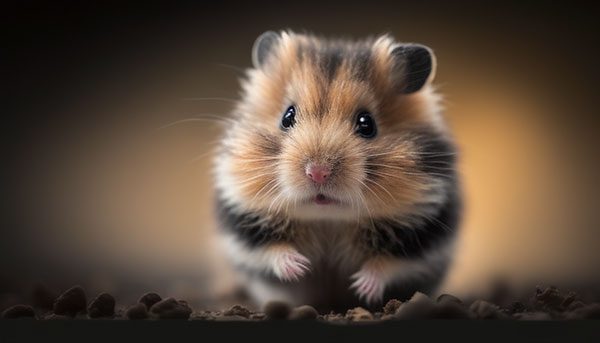Why is My Hamster Itching?
Hamsters are superactive rodents and do many things during the day. From digging and burrowing to scratching, you will never find them idle. But excessive itching is not part of their daily activities. This might be concerning and you must find out the reasons.
So, why is my hamster itching? Hamsters do scratch a lot, but excessive scratching can indicate skin infection (mange), dry skin, parasites (fleas and ticks), food allergies, and stress. Moreover, as hamsters like to clean their fur, you should be mindful of their normal scratching and incessant scratching.
If you see your hamster scratching excessively, you should consult a vet to address underlying issues. Read more to find out about hamster’s itching.
Why does Hamster Itch And How To Address The Issues?
Scratching is common in hamsters as they usually do it as part of their regular daily grooming regimen. Moreover, they get rid of filth and dirt by rubbing and licking themselves.

But excessive scratching can indicate a serious condition. Here’s how to determine whether your hamster’s itching points to a major health issue.
1. Dry Skin
Like humans, hamsters can also get dry skin, leading to itching and excessive scratching. Although dry skin is not a big health problem, consulting your vet is best.
To check if your hamster suffers from dry skin, you should;
- Check if the hamster has dandruff or skin flakes on its coat
- Examine the hamster’s ears from the back. If you see a hamster’s ears and coat are flaky and rough, it indicates dry skin
Note that dandruff and dry skin indicate a bad diet or malnutrition in hamsters. So by taking care of your hammies’ diet, you can treat dry skin.

2. Parasites
One of the major reasons for your pet’s itching and scratching is parasite infestation. Moreover, the worst part of getting parasites is that they are contagious. If you have other pets (dog or cat) around, they can also get infected or infect your hamster with parasites.
To get rid of parasites, you have to follow the sterilizing protocol for your home, which is:
- Spray Pyrethrin on your hamster to get rid of the ticks and fleas. You can use flea shampoo as well to clear off parasites
- Next, change the bedding of your hamster
- Thoroughly clean your hamster’s cage, toys, bowls, and nests
- You should also clean all carpets in your home with flea carpet powder
- Not only should your hamster’s bedding and cage be cleaned, but other pets’ cages and bedding must be sterilized the same way
- You should also clean your other pets with flea shampoo and get new collars
3. Mange
Although fleas and ticks lead to excessive itching in hamsters, mites can develop mange. Mange is a contagious skin disease that can spread from one animal to another.
If you suspect your hamster has mange symptoms, you should isolate him. Also, you should check if your hamster has the following:
- Swelling or blisters on the skin due to excessive itching
- Redness or skin rashes
- Skin bumps and scabs
Mange is a serious condition that needs a visit to the vet as soon as you find symptoms.
4. Allergies
Excessive itching can also indicate allergies in your pet hamster. The allergies can be due to different reasons such as food changes, scent or perfume, furniture polish, bedding, etc.
Note that using cedar shavings in hamsters’ bedding is not good as it leads to allergies. According to studies, cedar can give rise to various health problems in hamsters, such as liver damage. Besides itching, the symptoms of allergies in hamsters are:

- Sneezing and runny nose and eyes
- Breath shortness
- Swelling on feet
- Hair fall
Contact your veterinarian for assistance in diagnosing and treating the problem if the itching and other symptoms persist.
5. Diet Problems
Another reason for hamster itching is inadequate or inappropriate nutrition. Although hamsters love to have fun with the seeds of sunflowers and other plants, you should not depend on them solely for their dietary needs.
You should make sure your hamster gets adequate nutrition. Regarding that, hamster pellets are the perfect food choice for hammies.
Fruits and veggies like apples, carrots, peas, and other treats are a good addition to your hamster’s diet.
However, the most typical food that leads to allergies in hamsters are:
- Nuts
- Sunflower seed
- Kernels or Corn
- Wheat
- Artificial food colors.
6. Stress
You might be surprised to know that stress and anxiety in hamsters can also lead to itching.

For that, you should make sure your hamster has the following:
- A running wheel or levels in the cage
- Adequate bedding to meet his nesting and digging needs
- Enough food and snacks around the cage
- Wooden box or casing to let him hide and rest
- Chew toys for filing down the teeth
- Play tunnels and tubes are connected to the cage for amazing playtime.
Moreover, keeping your hamster in the dark and out of reach of other pets would be best. Since hamsters are prey animals, their natural survival instinct makes them stressed if they see other pets around.
7. Excitement
While there are medical reasons for scratching, hamsters sometimes do so out of exhilaration. To check if the hamster is scratching himself out of excitement, you should see a hamster’s smell glands.

If your hamster scratches them, it indicates excitement. This behavior is more common in male hamsters than female hamsters since the former have large smell glands.
If you’re concerned about your hamster’s well-being, you may find our articles on hamsters with Down syndrome and how long hamsters can go without water helpful. Our article on hamsters with Down syndrome provides a detailed overview of this genetic disorder in hamsters, including the symptoms and the best ways to care for your furry friend. Meanwhile, our article on how long hamsters can go without water explains how to keep your hamster hydrated and the signs of dehydration to look out for.FAQs
Below we mention some of the most common questions regarding the hamster’s itching problems.
Q: Does itching make Hamster rub against things?
Not necessarily. Although itching can make your hamster rub against things, that is not common. Your hamster usually rubs against things to spread their scent.
And male hamsters are more prone to scratch smell glands than females to spread smell. If you see your hamster rubbing smell glands too much against things, you should check for the reasons we stated above.
Q: How do I stop my hamster from itching?
You can address the itching problem due to dry skin by applying petroleum jelly to the ears and back. Dry skin gets hydrated with petroleum jelly. Moreover, it would be best if you also provide enough food and water to your hamster to get rid of itching.
Lastly, you should consult a vet to diagnose the reason for scratching and address the problem.
Q: Do hamsters scratch when stressed?
Yes. Hamsters scratch when stressed. So if you see hyperactiveness in hamsters, such as continuous digging and other monotonous habits like rolling, scratching, licking, or scurrying in circles, your little friend needs help.
Conclusion
Hamsters itch themselves regularly; however, if you see excessive itching that leads to scabs and hair loss, you should seek a vet’s help. There are many reasons for hamsters’ itching, such as allergies, parasites, mange, stress, excitement, boredom, and dry skin.
While petting a hamster, you should be mindful of all the reasons that can lead to itching. Moreover, if you don’t understand the reason behind your hamster’s agony, reach out to a vet because they can better guide you about the problem.




